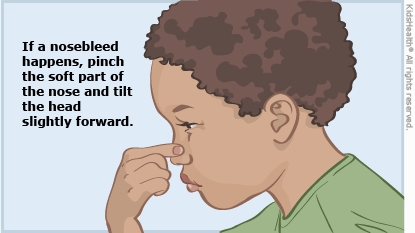Nosebleeds
Article Translations: (Spanish)
Most nosebleeds look worse than they are. In other words, nosebleeds are messy, a little uncomfortable, and sometimes even scary, but they're usually no big deal.
A kid might get nosebleeds just once in a while or more often. The nosebleeds that are most common in kids usually happen near the front of the nose, on the wall separating the two sides of the nose (the septum), and usually start from just one nostril.
Sometimes nosebleeds start farther back in the nose, but this is rare and mostly happens in older people or those who have high blood pressure or injuries to their nose or face.
If You Get a Nosebleed
You know that you should see a doctor if your nosebleed was caused by an injury, such as a punch. But what if it just starts bleeding on its own?
Follow these steps:
- Don't lie down. Sit up or stand.
- Use tissues or a damp washcloth to catch the blood.
- Tip your head forward. Don't lean your head back; this can make blood run down your throat.
- Pinch the soft part of your nose together (just below the bony part of your nose) and breathe through your mouth. Do this for 10 minutes. Make sure you hold the pressure for 10 minutes without stopping. It seems like a long time when you actually do it, so having someone check the time may help.
- If your nosebleed doesn't stop after 10 minutes of pressure, pinch it for another 10 minutes. If it still hasn't stopped, your mom, dad, or another adult should talk to a doctor.
- Do not pick, rub, or blow your nose — this can make your nose bleed more.

When Should I See a Doctor?
Your parent should call the doctor or take you to the emergency department if:
- You feel dizzy, weak, or faint (like you might pass out).
- Your nose is bleeding fast or you seem to be losing a lot of blood.
- You just started taking a new medicine.
- You have other symptoms, such as unusual bruising on your body.
- You are bleeding for a long time after you get hurt.
- You are bleeding from other areas of your body, such as your gums.
What Causes Nosebleeds?
Most nosebleeds happen when the little blood vessels that line the inside of the nose break and bleed. These blood vessels are very fragile and lie very close to the surface, which makes them easy targets for injury.
Common reasons are:
- nose picking
- sticking something up the nose
- a cold or allergy, especially with sneezing, coughing, and nose blowing
- dry, heated, indoor air (usually during winter), which causes the inside of the nose to become cracked, crusted, and itchy
Less often, injuries to the outside of the nose, face, or head can cause nosebleeds. If this happens, you need to see a doctor right away.
Can I Prevent Nosebleeds?
If you'd like to get fewer nosebleeds:
- Don't pick your nose or stick anything up your nose.
- Avoid blowing your nose too forcefully.
- If you have allergies, see a doctor about them. If you get your allergies under control, your nose probably won't be as stuffy and irritated.
- Wear protective gear, such as helmets for hockey, football, and baseball and any other sport or activity that requires them.
When the inside of your nose feels dry and itchy, it can be tempting to pick it. Talk to your mom or dad about trying one or two of these tips to keep it moist:
- Use a saline (saltwater) nasal spray, saline nose drops, or saline gel two or three times a day.
- Ask an adult to place a small amount of petroleum jelly or antibiotic ointment on the end of a cotton swab. Dab this gently around your nostrils.
- Ask to use a humidifier in your bedroom. Humidifiers send a fine mist of water into the air and this keeps the air from being too dry. When the air is damp, your nose is less likely to feel dry inside. In fact, one doctor said a humidifier is "like a vacation for your nose"!
Note: All information is for educational purposes only. For specific medical advice, diagnoses, and treatment, consult your doctor.
© 1995-2024 KidsHealth ® All rights reserved. Images provided by iStock, Getty Images, Corbis, Veer, Science Photo Library, Science Source Images, Shutterstock, and Clipart.com

